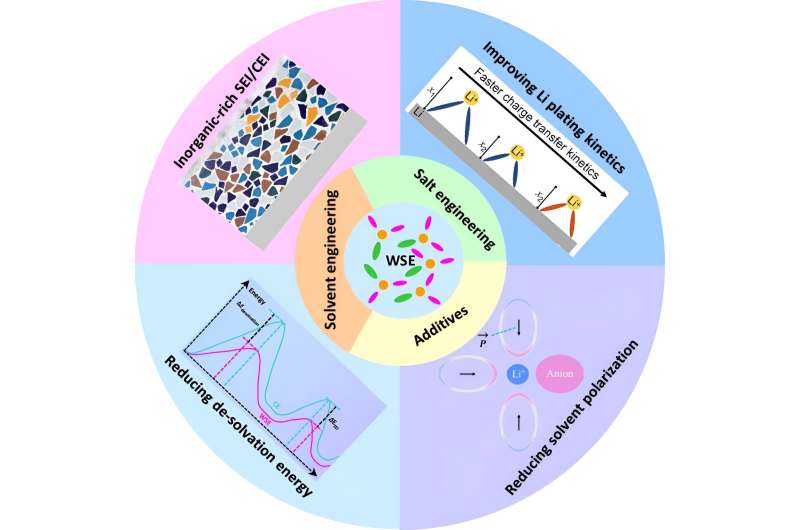
Lithium batteries power our phones, computers, many of our cars and even our drills and weedwhackers. But as technology advances, can they keep up in their current format? No, but there is a way forward, according to a new review paper from researchers at Hong Kong Polytechnic University, by further developing the electrolytes that allow for energy storage and discharge.
The team published their work in Energy Materials and Devices on September 18, 2023.
“Lithium batteries have revolutionized our modern life,” said first author Zhijie Wang, a Postdoctoral Research Fellow in the Department of Applied Physics and the Research Institute of Smart Energy at Hong Kong Polytechnic University. “The performance of lithium batteries—including energy density, lifespan, safety and more—is greatly determined by the recipe and microstructure of the electrolytes.”
Lithium batteries consist primarily of two current collectors, a negatively charged electrode, a positively charged electrode, an electrolyte and a separator. The electrolyte carries positively charged lithium ions from the positively charged electrode through the separator to the other electrode and negatively charged ions in the other direction. As the lithium ions move through the electrolyte, the anode collects free electrons, leading to a positive charge at one current collector. That positive current discharges to power a device, flowing through and returning to the battery as a negative current.
Electrolytes most commonly comprise a solution of lithium salt in a polar solvent, or a substance that uses a tiny electrical charge produced by the shape of its constituent molecules to dissolve the salts and free the lithium ions. In conventional electrolyte, lithium ions separate with the salt anions; in the (localized) high-concentration electrolytes developed in recent years, salt anions are solvated with Li ions, and they have unique functions in improving battery performance.
However, Wang said, a type called weakly solvating electrolytes first proposed for this use three years ago may offer a pathway to more robust batteries. In this type of electrolyte, the lithium ions are weakly coordinated with the solvent molecules, and they also coordinate with the negatively charged salt anions.
“Such a structure can be obtained in a relatively dilute salt concentration and without the use of non-solvating diluters,” Wang said. “This makes it different from conventional electrolytes and (localized) high-concentration electrolytes. It can improve the low-temperature, fast-charging, safety and cycling properties of lithium batteries, so it has attracted intensive research interest in recent years.”
In this study, Wang and corresponding author Biao Zhang examined recent research papers on weakly solvating electrolytes and concluded that basic design principles and future research directions were lacking. Zhang is an associate professor in the Department of Applied Physics and the Research Institute of Smart Energy at Hong Kong Polytechnic University.
“We found, from the current literature, that the key to constructing weakly solvating electrolytes is creating a balance between the interactions of lithium ions with solvent and anions,” Wang said. “We also determined that the design concepts of weakly solvating electrolytes can be extended to other batteries, such as systems made with sodium, potassium, magnesium or zinc.”
The researchers also recommended that future work in the field should focus on simplifying the synthesis procedures, improving yields and reducing costs of the electrolyte components.
“The goal of this paper is to promote the understanding of both research and industrial communities on the functions, design principles and recent research progress of the emerging weakly solvating electrolytes,” Wang said. “We hope our insights contribute to developing next-generation lithium batteries with robust properties and thus boost their share of the power source market, especially in electric vehicles.”
More information:
Zhijie Wang et al, Weakly solvating electrolytes for next-generation lithium batteries: design principles and recent advances, Energy Materials and Devices (2023). DOI: 10.26599/EMD.2023.9370003
Provided by
Tsinghua University Press
Citation:
Stronger lithium batteries may need ‘weaker’ solvation structure, researchers report (2023, October 12)
retrieved 12 October 2023
from https://techxplore.com/news/2023-10-stronger-lithium-batteries-weaker-solvation.html
This document is subject to copyright. Apart from any fair dealing for the purpose of private study or research, no
part may be reproduced without the written permission. The content is provided for information purposes only.
Stay connected with us on social media platform for instant update click here to join our Twitter, & Facebook
We are now on Telegram. Click here to join our channel (@TechiUpdate) and stay updated with the latest Technology headlines.
For all the latest Technology News Click Here
For the latest news and updates, follow us on Google News.
